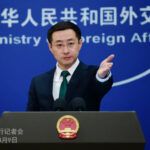The case for a world republic
By Tad Daley | June 25, 2012
A reflection on:
Confronting the Bomb: A Short History of the World Nuclear Disarmament Movement
Lawrence Wittner
272 pages, $21.95
In 2011, people across the planet reached out to Japan in the wake of the earthquake and tsunami. Millions watched as one nation after another rose in mass revolutions across the Arab world. The Occupy movement blossomed, as citizens in cities around the globe expressed rage over the excesses of capitalism and corporate power. And Time magazine named “The Protester” its annual Person of the Year.
A reflection on:
Confronting the Bomb: A Short History of the World Nuclear Disarmament Movement
Lawrence Wittner
272 pages, $21.95
In 2011, people across the planet reached out to Japan in the wake of the earthquake and tsunami. Millions watched as one nation after another rose in mass revolutions across the Arab world. The Occupy movement blossomed, as citizens in cities around the globe expressed rage over the excesses of capitalism and corporate power. And Time magazine named "The Protester" its annual Person of the Year.
The world has never been smaller. Citizen movements increasingly demonstrate their limitless promise. So, think it sounds too dreamy to imagine that someday people power might transform our small world into one world — a united republic of Earth?
Then read Lawrence Wittner's 2009 book, Confronting the Bomb: A Short History of the World Nuclear Disarmament Movement. And think again.
Dawn of a movement. Confronting the Bomb is a condensation of Wittner's epic, three-volume masterpiece of historical research, The Struggle Against the Bomb. An overarching message of the book will surprise even nuclear policy experts, because Wittner starts with an incontrovertible historical fact almost wholly forgotten today: For the first several years of the nuclear age, the ultimate aspiration of the disarmament crowd was not just to eliminate nuclear arsenals, but to create a federal republic of the world.
Wittner describes how, in the late 1940s, the movement for world government was every bit a force as the remarkable movements that would follow, like the environmental, civil rights, and women's movements. The "United World Federalists," who aspired "to strengthen the UN into a world government," marshaled 720 chapters and nearly 50,000 members. Its president, Alan Cranston, would become a four-term US senator (as well as a Bulletin contributor and mentor to this author). University of Chicago President Robert Maynard Hutchins assembled leading intellectuals and anointed them "The Committee to Frame a World Constitution." The 1947 National Debate Tournament topic for all US high schools was "Resolved: That a federal world government should be established." And the Bulletin's June 1947 cover — the first to display the Doomsday Clock — highlighted an article by Harrison Brown (future Bulletin editor-in-chief) titled "The World Government Movement in the United States."
Many of the foremost figures of the day also challenged the assumption that humanity must forever remain armed against itself: Albert Einstein, E.B. White, Dorothy Thompson, Jean-Paul Sartre, Arnold Toynbee, John Steinbeck, Bertrand Russell, Senator J.W. Fulbright, and Supreme Court Justice William O. Douglas. Also on board at the time were three already-prominent young men with even more prominent futures awaiting them: John F. Kennedy, Richard Nixon, and Ronald Reagan. They insisted humankind could govern itself on a global level just as it does on every lower level — through a legislature, an executive, a judiciary, and police to enforce the law.
Though world government did not come to pass, the movement still had a vital impact. The Truman administration's first major initiatives to control the terrifying new nuclear technology — the Acheson-Lilienthal Report and the Baruch Plan — proposed establishing an international body to maintain monopoly ownership over all nuclear materials, launching intrusive inspection regimes inside every country, and eliminating the veto over nuclear matters in the new UN Security Council. While this stopped far short of world government, it also traveled far beyond the status quo.
It is hard to imagine even antinuclear advocacy organizations today putting forth such a plan, let alone the US government. Robert Oppenheimer said these initiatives proposed "that in the field of atomic energy there be set up a world government … [and] a renunciation of national sovereignty." Thus Wittner's conclusion: Those proposals were put forth in 1946 as "a direct result of the new climate of thinking fostered by critics of the Bomb."
Reagan, new abolitionists, and a paradigm shift. As the Cold War progressed, the world republic movement almost completely disappeared. But Confronting the Bomb — like no other book — overflows with direct evidence that, time and again, popular antinuclear sentiment has deeply affected nuclear policy. Consider the example of Ronald Reagan.
Reagan was the most dangerous nuclear hawk ever to serve as president. Before he assumed office, Reagan opposed all nuclear arms control agreements. He told voters they would be safer if the United States deployed the B-1 bomber, neutron bomb, Trident submarine, and MX missile, because Soviet leaders were "monsters" and "godless communists." "Armageddon isn't far off," he declared. "Fire and brimstone will be rained down upon the enemies of God's people. … They'll be destroyed by nuclear weapons."
Unsurprisingly, soon after his inauguration, President Reagan dramatically increased the military budget; sought to add the deadliest weapons to the US arsenal; deployed new medium-range nuclear missiles in Europe; and researched a missile defense system that, from the Soviet perspective, could provide Washington the ability to launch a nuclear first strike and then defend itself against a remnant Soviet nuclear response. Even more worrisome was the breezy way administration officials talked about nuclear use. Both Vice President George H.W. Bush and several top nuclear policy officials mused openly about "waging and winning" something they called a "protracted nuclear war." They insisted the West could "prevail … on terms favorable to the United States."
The risk of infinite catastrophe inherent in the nuclear buildup, rhetoric, and tensions of the hour frightened many previously casual observers out of their homes and onto their streets — mobilizing a vast antinuclear movement known as Nuclear Freeze. Wittner thoroughly details the campaign's strategies to illuminate the overwhelming public support for ending the arms race. Nuclear Freeze reached its zenith on June 12, 1982, when nearly one million people gathered in New York's Central Park to demand a halt to the incessant spiral of nuclear arms competition. The New York Times called it the largest political demonstration in US history.
Initially, Reagan disparaged and dismissed the Freeze movement. He called it "a very dangerous fraud," claimed some of its organizers were not only communist sympathizers but "foreign agents," and asserted the movement's leaders "want the weakening of America."
However, during Reagan's second term, his administration reversed course entirely: In fact, it went much further than a freeze. Reagan pursued the Strategic Arms Reduction Treaty — not just to halt the growth of arsenals, but to reduce their sizes. He eliminated an entire category of nuclear weapons in the Intermediate-Range Nuclear Forces Treaty. He traveled to Geneva to meet with new Soviet General Secretary Mikhail Gorbachev; the pair proclaimed, "A nuclear war cannot be won and should never be fought." Finally, in Reykjavik, Iceland, the two leaders came achingly close to striking a deal to go all the way. To global zero.
Why the dramatic shift? Among other explanations, Wittner cites administration officials' statements, revealing the antinuclear movement's direct influence on the change in course. Secretary of State George Shultz said, "Given the political climate, we could not [modernize and deploy] these deadly weapons." Failing to negotiate, White House Chief of Staff Donald Regan said, "could have incalculable consequences in terms of world opinion." And President Reagan himself said, "From a propaganda point of view, we were on the defensive."
Thus, in Reagan's second term, real arms control policies and an abolitionist vision replaced the provocative nuclear policies and irresponsible saber-rattling that marked his first term — and that could well have brought about the end of civilization.
So who saved the world from that? According to Wittner, you saved the world from that.
The shape of things to come. Wittner expresses the abolition movement's greatest success in the very first sentence of Confronting the Bomb: "How should we account for the fact that, since 1945, the world has avoided nuclear war?" Wittner describes how, just a few years after Nagasaki and Hiroshima, the thought that leaders might again intentionally use nuclear weapons generated almost universal revulsion. And he shows how the intensity of that antipathy — for two-thirds of a century now — has dissuaded all nuclear-armed nations from crossing that Rubicon.
So far.
At the end of Confronting the Bomb, Wittner returns to the inception of the antinuclear movement:
The answer lies in the pathology of the nation-state system, a system that throughout its history has produced arms races and wars. … [We] should do no less than change that system. … Citizens' movements and a strengthened United Nations could rein in war-making states until, like New Jersey and New York, these semi-sovereign jurisdictions would never think of resolving their disputes through war, much less nuclear war.
That's exactly right. New Jersey and New York, of course, not only do not make war upon one another, they do not spend a dime to defend themselves from one another. President Harry Truman made the same point in 1945: "There isn't a reason in the world why we cannot do that internationally. It will be just as easy for nations to get along in a republic of the world as it is for you to get along in the republic of the United States."
What kind of UN system might we design from scratch today? Is democratic federal world government desirable — or might the costs exceed the benefits? If desirable, will it ever be achievable? If not desirable or achievable, is there any alternative world order imaginable that might someday eliminate both war and standing militaries from the human condition? These sorts of questions — among foreign affairs professionals, peace activists, college students, columnists, blogosphere commentators, talk radio hosts, and television pundits — are conspicuous only by their complete absence from the contemporary policy debate.
Wittner's book offers two great contributions to the literature of war and peace. First, he demonstrates that the nuclear disarmament movement has played enormously influential roles, both in holding back the most worrisome nuclear policies, postures, and deployments, and in preventing global thermonuclear war. Second, Wittner unearths a long-forgotten but indisputable history: Political thinkers and activists at the dawn of the nuclear age offered a comprehensive and wonderful vision — not only a world without nuclear weapons, but a world without armies, and a world without war.
Most of those figures from the 1940s have long since departed. No more can be done by their hands. The question of whether we might someday engineer the social evolution of our own species rests now squarely in ours.
Together, we make the world safer.
The Bulletin elevates expert voices above the noise. But as an independent nonprofit organization, our operations depend on the support of readers like you. Help us continue to deliver quality journalism that holds leaders accountable. Your support of our work at any level is important. In return, we promise our coverage will be understandable, influential, vigilant, solution-oriented, and fair-minded. Together we can make a difference.
Topics: Book Review, Nuclear Weapons














